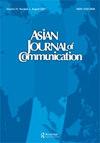网络民族主义与跨国文化消费的交织:韩流粉丝的角色冲突
IF 1.5
2区 文学
Q2 COMMUNICATION
引用次数: 0
摘要
摘要当爱国主义与跨文化交际产生的情感依恋交织在一起时,受网络民族主义影响的K-pop粉丝会陷入角色冲突的困境,并采取多种应对策略,从而为揭示政治与娱乐重叠领域的结果提供了新的思路。通过对一系列民族主义事件中粉丝行为的分析,这些试图跨越国界形成情感共同体的粉丝陷入了身份选择与角色期待的两难境地。选择的结果与爱国认知、粉丝沉浸、粉丝期望、爱国者期望、风险感知等因素有关,导致自发爱国主义、妥协爱国主义、温和崇拜明星和抵抗崇拜明星四种态度倾向。该研究认为,应该预防网络民族主义转变为狭隘民族主义的趋势,并需要了解作为文化共同体的fandom的政治潜力。关键词:网络民族主义、角色冲突、韩流粉丝、情感体验、跨国文化消费感谢编辑和匿名审稿人对本文提出的具有启发性的意见和建议。她也感谢清华大学的张益驰博士对她论文写作的帮助。披露声明作者未报告潜在的利益冲突。作者简介夏雨欣夏雨欣于2023年毕业于中国浙江大学传媒与国际文化学院,获博士学位。主要研究方向为跨文化传播学、媒介社会学、政治传播学。本文章由计算机程序翻译,如有差异,请以英文原文为准。
The interweaving of network nationalism and transnational cultural consumption: the role conflict of K-pop fans
ABSTRACTAs the patriotism interweaves with emotional attachment produced by cross-cultural communications, K-pop fans influenced by network nationalism will fall into the predicament of role conflict and adopt multiple coping strategies, hence providing new ideas for revealing the results of overlapped fields of politics and entertainment. Analysis of fans’ behaviors in a series of nationalistic events establishes that these fans attempting to form an emotional community across the border are caught in a dilemma of identity choice with various role expectations. The consequences of the choice are related to some factors such as patriotic cognition, fans’ immersion, fans’ expectations, patriots’ expectations, and risk perception, leading to four attitude tendencies including spontaneous patriotism, compromise patriotism, gentle star-worship, and resistance star-worship. This study argues that precautions should be taken against the tendency that network nationalism transforms into narrow nationalism and that we need to understand the political potential of fandom as a cultural community.KEYWORDS: Network nationalismrole conflictK-pop fansemotional experiencetransnational cultural consumption AcknowledgementsThe author would like to extend her gratitude to the Editors and anonymous Reviewers for their enlightening comments and suggestions on this article. She also thanks Dr Yichi Zhang from Tsinghua University for fruitful discussion and help with paper writing.Disclosure statementNo potential conflict of interest was reported by the author(s).Additional informationNotes on contributorsYuxin XiaYuxin Xia received her PhD degree from the College of Media and International Culture of Zhejiang University (China) in 2023. Her research interests include cross-cultural communication, media sociology and political communication.
求助全文
通过发布文献求助,成功后即可免费获取论文全文。
去求助
来源期刊

Asian Journal of Communication
COMMUNICATION-
CiteScore
3.70
自引率
0.00%
发文量
38
期刊介绍:
Launched in 1990, Asian Journal of Communication (AJC) is a refereed international publication that provides a venue for high-quality communication scholarship with an Asian focus and perspectives from the region. We aim to highlight research on the systems and processes of communication in the Asia-Pacific region and among Asian communities around the world to a wide international audience. It publishes articles that report empirical studies, develop communication theory, and enhance research methodology. AJC is accepted by and listed in the Social Science Citation Index (SSCI) published by Clarivate Analytics. The journal is housed editorially at the Wee Kim Wee School of Communication and Information at Nanyang Technological University in Singapore, jointly with the Asian Media Information and Communication Centre (AMIC).
 求助内容:
求助内容: 应助结果提醒方式:
应助结果提醒方式:


